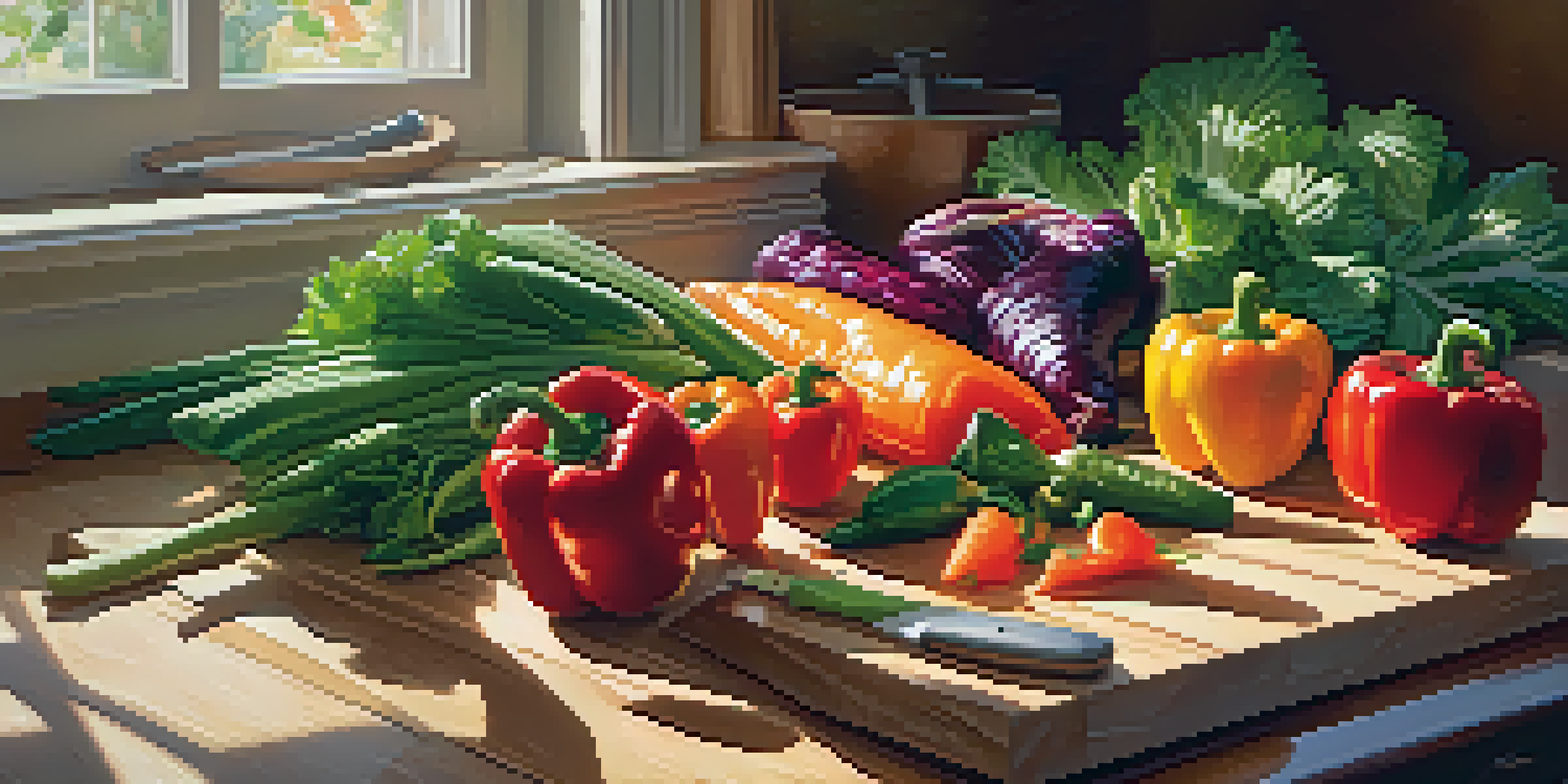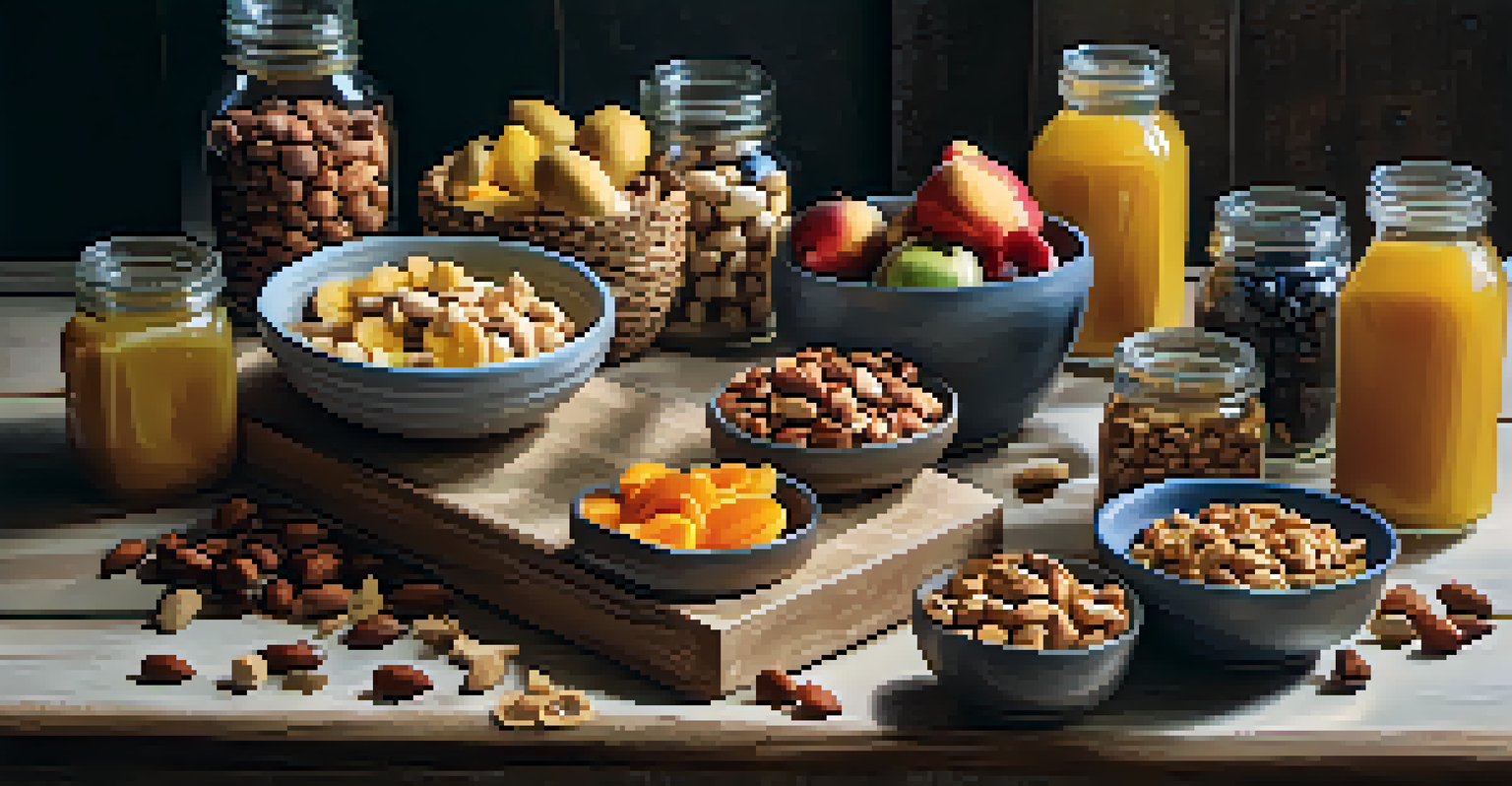Healthy Cooking for Beginners: Start Your Culinary Journey

Understanding Healthy Cooking Basics for a Better Start
Healthy cooking is about making nourishing choices without sacrificing flavor. It focuses on using whole, unprocessed foods like fruits, vegetables, lean proteins, and whole grains. By understanding the basics, you can create meals that are both satisfying and beneficial for your health.
Let food be thy medicine and medicine be thy food.
Start by familiarizing yourself with cooking methods that preserve nutrients, such as steaming, grilling, and baking. These techniques help you maintain the integrity of the ingredients while adding minimal extra fat. Remember, cooking doesn't have to be complicated; simplicity often leads to the best results.
As you learn more about healthy cooking, you'll discover how to balance your meals with the right nutrients. Incorporating a variety of colors on your plate not only makes your meals visually appealing but also ensures you're getting a spectrum of vitamins and minerals.
Essential Kitchen Tools Every Beginner Needs
Equipping your kitchen with the right tools can make cooking much easier and more enjoyable. For beginners, having a few key items like sharp knives, cutting boards, a good set of pots and pans, and measuring cups is essential. These tools help streamline your cooking process and improve your efficiency.

Additionally, consider investing in versatile appliances like a blender or food processor. These can help you create smoothies, soups, and sauces with ease. A slow cooker is another fantastic addition, allowing you to prepare meals in advance with minimal effort.
Healthy Cooking Basics
Understanding the importance of using whole, unprocessed foods and nutrient-preserving cooking methods can enhance both flavor and health.
Don’t forget about basic utensils such as spatulas, wooden spoons, and mixing bowls. Having these items on hand ensures you’re ready to tackle any recipe that catches your interest. A well-equipped kitchen can turn cooking from a chore into a fun, creative outlet.
Choosing Fresh Ingredients for Flavor and Health
When it comes to healthy cooking, the quality of your ingredients matters. Fresh produce not only tastes better but also packs more nutrients than canned or processed options. Visit your local farmer's market or grocery store to find in-season fruits and vegetables that can inspire your meals.
Cooking is like love. It should be entered into with abandon or not at all.
Incorporating fresh herbs and spices is another way to elevate your dishes without adding extra calories. They enhance flavor and offer various health benefits, turning simple recipes into culinary delights. Experimenting with different herbs can lead to exciting discoveries in your cooking journey.
Learning how to select and store your ingredients properly is also crucial. Understanding how to choose ripe fruits or fresh vegetables can improve your meals dramatically. Plus, knowing how to store your ingredients helps reduce waste and keeps your kitchen organized.
Simple, Healthy Recipes to Kickstart Your Cooking Adventure
As a beginner, starting with simple recipes can build your confidence in the kitchen. Think of easy meals like stir-fries, salads, or sheet pan dinners that require minimal prep and cook time. These dishes allow you to experiment with different ingredients without overwhelming yourself.
For instance, a colorful veggie stir-fry can be made with your choice of vegetables, a protein source, and a splash of soy sauce. This not only showcases the fresh ingredients but also provides a balanced meal in no time. Don't hesitate to adjust recipes based on your preferences.
Essential Kitchen Tools
Equipping your kitchen with basic tools and versatile appliances can streamline cooking and make it a more enjoyable experience.
Another great option is a hearty quinoa salad. Combine cooked quinoa with diced vegetables, beans, and a light vinaigrette for a nutritious meal. Simple recipes like these are not only delicious but also provide a sense of accomplishment as you develop your cooking skills.
Meal Planning to Save Time and Stay Healthy
One effective strategy for healthy cooking is meal planning. By dedicating some time each week to plan your meals, you can ensure you have all the necessary ingredients on hand. This helps you avoid last-minute unhealthy food choices and keeps you on track with your health goals.
Start by choosing a few recipes for the week and creating a shopping list based on those meals. Batch cooking is also a fantastic way to save time—prepare larger quantities of meals and store them in portions for later use. This way, you always have healthy options readily available.
Meal planning doesn’t have to be rigid; allow some flexibility for spontaneous dining or trying new recipes. The key is to create a structured approach that works for your lifestyle while still being enjoyable and rewarding.
Exploring Healthy Snacks to Curb Cravings
Snacking can be a healthy part of your diet if you choose the right options. Instead of reaching for processed snacks, consider preparing your own healthy alternatives. Fruits, nuts, yogurt, and whole-grain crackers are excellent choices that provide essential nutrients without the extra sugars and unhealthy fats.
For a quick and satisfying snack, try making energy bites using oats, nut butter, and a touch of honey. These little treats are not only delicious but also keep you fueled throughout the day. Having nutritious snacks on hand helps you resist the temptation of less healthy options.
Meal Planning Benefits
Meal planning helps you stay organized, saves time, and ensures you make healthier food choices throughout the week.
Experimenting with different snack combinations can also keep things interesting. Pairing apple slices with almond butter or hummus with veggie sticks adds variety and excitement to your snacking routine. Remember, healthy snacks can be both enjoyable and beneficial for your overall well-being.
Staying Motivated on Your Healthy Cooking Journey
Embarking on a healthy cooking journey is exciting, but it can also come with challenges. Staying motivated is key to making lasting changes in your eating habits. Set small, achievable goals for yourself, whether it’s trying a new recipe each week or incorporating more vegetables into your meals.
Surrounding yourself with a supportive community can also boost your motivation. Join cooking classes, online forums, or social media groups where you can share your experiences and learn from others. Celebrating your successes, no matter how small, helps reinforce your commitment to healthy cooking.

Lastly, remember that cooking is a skill that improves with practice. Don't be discouraged by mistakes; each setback is an opportunity to learn. Embrace the journey and enjoy the delicious results of your efforts as you grow more confident in the kitchen.